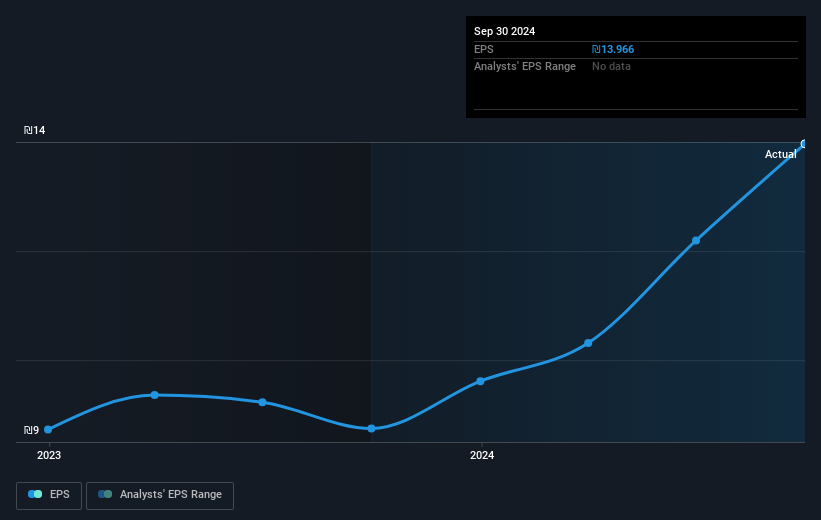- Israel
- /
- Food and Staples Retail
- /
- TASE:YHNF
M.Yochananof and Sons (1988)'s (TLV:YHNF) earnings growth rate lags the 65% return delivered to shareholders

These days it's easy to simply buy an index fund, and your returns should (roughly) match the market. But investors can boost returns by picking market-beating companies to own shares in. For example, the M.Yochananof and Sons (1988) Ltd (TLV:YHNF) share price is up 56% in the last 1 year, clearly besting the market return of around 26% (not including dividends). So that should have shareholders smiling. In contrast, the longer term returns are negative, since the share price is 5.2% lower than it was three years ago.
While the stock has fallen 5.4% this week, it's worth focusing on the longer term and seeing if the stocks historical returns have been driven by the underlying fundamentals.
View our latest analysis for M.Yochananof and Sons (1988)
There is no denying that markets are sometimes efficient, but prices do not always reflect underlying business performance. One flawed but reasonable way to assess how sentiment around a company has changed is to compare the earnings per share (EPS) with the share price.
During the last year M.Yochananof and Sons (1988) grew its earnings per share (EPS) by 60%. We note that the earnings per share growth isn't far from the share price growth (of 56%). That suggests that the market sentiment around the company hasn't changed much over that time. It makes intuitive sense that the share price and EPS would grow at similar rates.
The company's earnings per share (over time) is depicted in the image below (click to see the exact numbers).

Dive deeper into M.Yochananof and Sons (1988)'s key metrics by checking this interactive graph of M.Yochananof and Sons (1988)'s earnings, revenue and cash flow.
What About Dividends?
As well as measuring the share price return, investors should also consider the total shareholder return (TSR). The TSR is a return calculation that accounts for the value of cash dividends (assuming that any dividend received was reinvested) and the calculated value of any discounted capital raisings and spin-offs. So for companies that pay a generous dividend, the TSR is often a lot higher than the share price return. As it happens, M.Yochananof and Sons (1988)'s TSR for the last 1 year was 65%, which exceeds the share price return mentioned earlier. The dividends paid by the company have thusly boosted the total shareholder return.
A Different Perspective
It's good to see that M.Yochananof and Sons (1988) has rewarded shareholders with a total shareholder return of 65% in the last twelve months. And that does include the dividend. That's better than the annualised return of 8% over half a decade, implying that the company is doing better recently. Given the share price momentum remains strong, it might be worth taking a closer look at the stock, lest you miss an opportunity. Before forming an opinion on M.Yochananof and Sons (1988) you might want to consider these 3 valuation metrics.
If you like to buy stocks alongside management, then you might just love this free list of companies. (Hint: many of them are unnoticed AND have attractive valuation).
Please note, the market returns quoted in this article reflect the market weighted average returns of stocks that currently trade on Israeli exchanges.
New: Manage All Your Stock Portfolios in One Place
We've created the ultimate portfolio companion for stock investors, and it's free.
• Connect an unlimited number of Portfolios and see your total in one currency
• Be alerted to new Warning Signs or Risks via email or mobile
• Track the Fair Value of your stocks
Have feedback on this article? Concerned about the content? Get in touch with us directly. Alternatively, email editorial-team (at) simplywallst.com.
This article by Simply Wall St is general in nature. We provide commentary based on historical data and analyst forecasts only using an unbiased methodology and our articles are not intended to be financial advice. It does not constitute a recommendation to buy or sell any stock, and does not take account of your objectives, or your financial situation. We aim to bring you long-term focused analysis driven by fundamental data. Note that our analysis may not factor in the latest price-sensitive company announcements or qualitative material. Simply Wall St has no position in any stocks mentioned.
About TASE:YHNF
M.Yochananof and Sons (1988)
Engages in the marketing and retail trade in the food and related products in Israel.
Proven track record with mediocre balance sheet.
Similar Companies
Market Insights
Community Narratives



